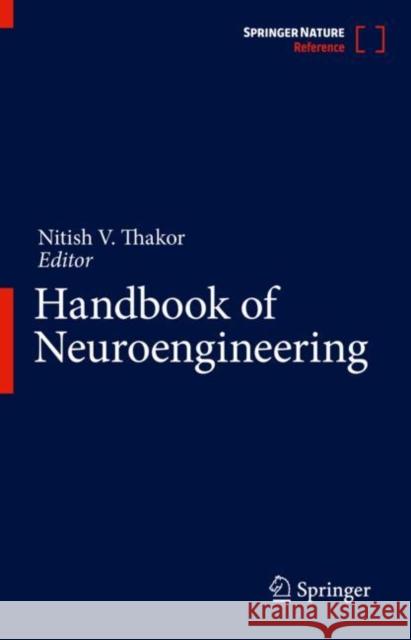Handbook of Neuroengineering » książka



(netto: 3633,71 VAT: 5%)
Najniższa cena z 30 dni: 3277,22
ok. 22 dni roboczych.
Darmowa dostawa!
1. Neural Sensors and Transducers
Neural electrodes (brain, spinal cord, periphery)Neurochemical sensors
Optogenetic interface
Tissue-engineered interfaces
Ultrasonic interface
Magnetic interface
2. Neural Circuits and Systems
Neural amplifiers
Sensing and Manipulation of Brain Neurochemistry
Neural recording and stimulation (bidirectional)
Wireless power/data or neural recording or stimulation circuitsWireless capacitive/inductive interface
Non-electrical Optogenetic, ultrasonic, magnetic interface
3. Neural Prostheses
Neural interface and upper limb prosthesis
Neural interface and lower limb prosthesis
Motor prosthesisSensory prosthesis
PNS interfaces
Bidirectional Neural prosthesis
4. Brain Computer Interface and Brain Machine Interface
Brain computer interface (BCI) – noninvasive, nonivasiveBCI algorithms, BCI applications
Brain machine interface (BMI) for locomotionBrain-Computer Interfaces in Clinical Applications
BMI – sensory prosthesis
BMI – memory and learning, augmentation
5. Neuromorphic Engineering and Neurocomputing
Models of neurons, integrate and fire neurons
Spiking network, spike encoding
Neural network circuitsNeuromorphic – touch, vision, auditory
Neuromorphic locomotion (CPG)
Neural computation on neuromorphic hardware
6. Neurorehabilitation and Neurorobotics
Neuroprosthesis and functional electrical stimulation (peripheral)
Robotic assisted therapy
Telerehabilitation
Virtual reality tools
Augmentative and alternative communication
Human augmentation
7. Neuromodulation
Peripheral and visceral neuromodulation (models and systems)
Spinal cord stimulation and restoration (models and systems)
Cochlear implants
Bionic vision (retinal prosthesis)
Deep brain stimulation
Optogenetic stimulation
Functional electrical stimulation (FES)
Non-invasive brain stimulation – (TMS, TDCS, FUS)
8. Neural Signal Processing
Neural Encoding EEG signal processing and applications
Evoked potential signal processing and applications
Diagnosis and localization if epileptic events
Neuromuscular activity
Sleep analysis
9. Cognitive Engineering
Human brain mapping
EEG mapping
Networks and connectivity
Connectome analysisComputational brain imaging (physiological networks)
Artificial intelligence
10. Neuroimaging
Brain imaging (overview)- X-ray, CT, PET
- MRI, fMRI, dtMRI
EEG mapping
MEG mapping
Neurophotonics
11. Clinical Neurotechnologies
Brain monitoring and diagnostics (EEG)
Brain monitoring and diagnostics (evoked potentials)
Brain monitoring – intensive care unit, operating room
Brain monitoring – epilepsy unit
Mobile and embedded devices
Neurosurgical technologies
12. Neurotechnologies – Industry, Intellectual Property, Regulatory, Social and Ethical Issues (TBD)
Regulatory roadmap for new neurotechnologies
Intellectual property protection
Translating into clinical and industrial outcomes
Clinical and social impact of neurotherapeutics and neuroprosthesisEthics of brain monitoring, stimulation, restoration, brain machine-interface
13. Clinical Neurotechnologies
Brain monitoring and diagnostics (EEG)
Brain monitoring and diagnostics (evoked potentials)
Brain monitoring – intensive care unit, operating room
Brain monitoring – epilepsy unit
Mobile and embedded devices
Neurosurgical technologies
14. Neurotechnologies – Industry, Intellectual Property, Regulatory, Social and Ethical Issues (TBD)
Regulatory roadmap for new neurotechnologies
Intellectual property protection
Translating into clinical and industrial outcomes
Clinical and social impact of neurotherapeutics and neuroprosthesis
Ethics of brain monitoring, stimulation, restoration, brain machine-interfaceNitish V. Thakor is the Director the Singapore Institute for Neurotechnology (SINAPSE) at the National University of Singapore, as well as Professor of Electrical and Computer Engineering and Biomedical Engineering at NUS. He maintains his position as a Professor of Biomedical Engineering, Electrical and Computer Engineering and Neurology at Johns Hopkins University in the USA. Dr. Thakor’s technical expertise is in the field of Neuroengineering, including neural instrumentation, nuromorphic engineering, neural microsystems, optical imaging of the nervous system, neural control of prosthesis and brain machine interface and cognitive engineering. He has pioneered many technologies for brain monitoring to prosthetic arms and neuroprosthesis. He is an author of more than 290 refereed journal papers, more than a dozen patents, and co-founder of 3 companies. He is currently the Editor in Chief of Medical and Biological Engineering and Computing, and was the Editor in Chief of IEEE TNSRE from 2005-2011 and presently the EIC of Medical and Biological Engineering and Computing. Dr. Thakor is a recipient of a Research Career Development Award from the National Institutes of Health and a Presidential Young Investigator Award from the National Science Foundation, and is a Fellow of the American Institute of Medical and Biological Engineering, IEEE, Founding Fellow of the Biomedical Engineering Society, and Fellow of International Federation of Medical and Biological Engineering. He is a recipient of the award of Technical Excellence in Neuroengineering from IEEE Engineering in Medicine and Biology Society, Distinguished Alumnus Award from Indian Institute of Technology, Bombay, India, and a Centennial Medal from the University of Wisconsin School of Engineering. He has given more than 50 keynotes and plenary talks, and was the Chair of the IEEE Grand Challenges in Life Science Conference in 2013 and will chair IEEE BIOROB conference in Singapore in June 2016 and the Gordon Conference on Advanced Health Informatics in Hong Kong in July 2016.
1997-2026 DolnySlask.com Agencja Internetowa
KrainaKsiazek.PL - Księgarnia Internetowa









